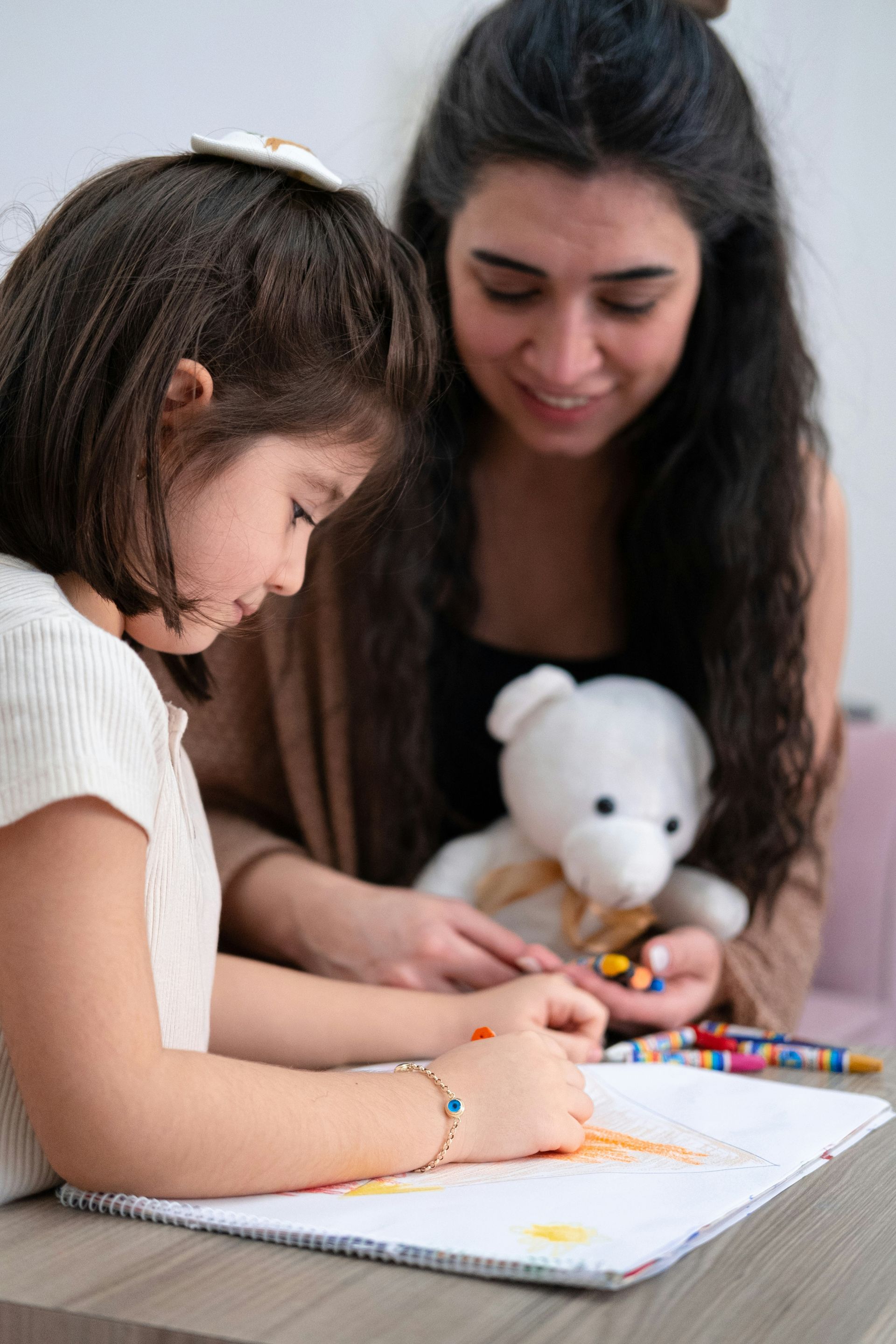
When I was parenting my kids, I encouraged them as much as possible by praising them. I told them “what a good job they were doing,” that "they were the best,” or “they were right."
It wasn’t until I started my journey into being a better parent that I realized there is a better way to praise than the words I used.
Praising your children is essential, but it’s not as simple as it sounds. When done right, praise can boost a child’s self-esteem, motivate them, and reinforce positive behaviours. However, when misused, it can lead to unintended adverse effects.
Let’s dive into why praising your children is essential, how to do it effectively, and what pitfalls to avoid.
The Difference Between Praising, Encouraging, and Rewarding
Balancing praise with encouragement and rewards can be highly effective:
Praise Effort, Not Just Results: Focus on the process and effort rather than the outcome. For example, you can say, “You’re so smart,” but a better way is, “You worked hard on that project, and it shows!” Praising the effort, not just the results, teaches children to value hard work and effort over innate ability.
Use Encouragement: Encouragement helps children stay motivated, especially when struggling. Statements like, “I know this is tough, but I believe in you,” or “Keep going, you’re doing great,” can be very powerful. Encouragement focuses on the ongoing process and helps children build resilience. When I was the owner of a hectic food trail and dealing with staff that were becoming overwhelmed because of the volume of orders to get out, I would often say words like, “One more order” or “We are getting there” to help them focus on what was right in front of them and not the bigger picture.
Offer Rewards Sparingly: Rewards can motivate children, but you should use them carefully.
Instead of always offering material rewards, consider non-material rewards like extra playtime, a special outing, or a simple heartfelt “thank you.”
For example, “Because you’ve been so helpful today, let’s have an extra story at bedtime” can be more meaningful than a toy. As parents, we want to please our kids and often fall into the trap of giving them almost everything they want.
At the end of the day, what they want the most is our attention. Put your technology aside and give them your undivided attention.

Why Praising Children Is Important
Praising children is more than saying “good job” or “well done” when they do something right. It plays a crucial role in their development and helps shape how they view themselves and their abilities. When you praise your child, you’re not only acknowledging their efforts and achievements but also reinforcing their sense of self-worth and confidence by:
Building Their Self-Esteem: Positive feedback makes children feel valued and competent. Children who hear positive affirmations about their actions or abilities believe in themselves. This self-belief is crucial as they navigate challenges and develop their identity.
Building self-esteem reminds me of my childhood and the effect on my self-esteem. I got high marks on most tests and would come home excited to share my news with my parents.
On this one test, I received a score of 99 out of 100. I was so proud of myself until my Dad commented on the one incorrect answer. I am sure he was joking, but it stuck with me even now because my parents didn’t acknowledge all the correct answers and the hard work of studying to get them. These comments stay with our children well into adulthood and prevent them from reaching their full potential.
Encouraging Positive Behaviour: Recognizing good behaviour encourages children to repeat it. Children, like adults, thrive on positive reinforcement. When you acknowledge the behaviours you value in your children, they will understand desirable behaviours and be motivated to exhibit them more frequently.
Motivating Effort and Persistence: Praise for effort teaches children to value hard work and resilience.
Emphasizing the process rather than the result helps your children appreciate the importance of perseverance and effort, which are vital life skills.
Strengthening Your Parent-Child Bond: Positive reinforcement fosters a nurturing and supportive relationship. When parents regularly praise their children, it creates an environment of trust and support, which is essential for a strong emotional bond.
It would have been more helpful for my Dad to recognize my efforts and achievements to strengthen our parent-child relationship. When children learn to appreciate their hard work and successes, they develop a strong sense of self-worth and motivation, boosting their self-esteem.

How to Use Encouraging Words and Phrases to Motivate Your Child
Effective praise is specific and sincere. Instead of generic statements like “Good job,” which is what I did, try to describe what you see and feel. Here are some detailed ways to offer praise:
Acknowledge Effort: Children often put significant effort into their tasks, even if the outcome isn't perfect. Recognizing this effort teaches them that hard work is valued. For example, you might say, “I saw how hard you worked on that puzzle. You were patient and didn’t give up!” Acknowledging effort shows you value the effort more than just the completed puzzle. Or, you can recognize if they make the slightest effort when doing a chore, such as making their bed. You can say, “I say that you pulled your sheets up and did the best to straighten them.”
Recognize Specific Actions: Specific praise helps children understand what behaviour you value as a parent and why. Instead of saying, “You were good today,” you could say, “Thank you for sharing your toys with your sister. That was very kind of you.” This type of praise helps children understand the importance of sharing and kindness.
Telling a child they are "good" or "bad" can significantly impact their self-esteem and behaviour. Labelling a child as "good" might make them feel valued, but it can also pressure them always to be perfect. On the other hand, calling a child "bad" can hurt their self-esteem and make them believe they can't do anything right. Instead of using these labels, focus on specific behaviours. For example, say, "You did a great job sharing your toys," or "Let's talk about why hitting isn't okay."
This approach helps children understand which behaviours are positive or need improvement without defining their worth based on their actions.
Highlight Improvement: Children need to know you notice their efforts to improve. For instance, “Your handwriting has improved so much! You’ve been practicing a lot, haven’t you?” Noticing their improvement encourages them to continue and recognize their hard work and progress.
Express Genuine Emotion: Children are perceptive and can tell when praise is insincere. Make sure your praise is heartfelt. For example, “I’m really proud of how you handled that situation. You were so calm and patient,” can have a powerful impact when it comes from a place of genuine pride and affection.
It wasn’t until I was sixty-six years old that someone told me they were proud of me. It brought tears to my eyes and made me speechless. It was my trainer, whom I have talked about in other blogs. It was so heartfelt. He recognized my hard work and determination. It meant the world to me and helped me build my self-esteem.

Here are More Specific Examples
Art Projects: Instead of saying, “Nice painting,” you could say, “I love how you used so many bright colors in your painting. It makes it look so cheerful!” This type of praise acknowledges the effort, creativity, and thought process behind the task.
Homework: Rather than just “Good job on your homework,” say, “You did great on your math homework. I can see you’re getting better at solving those problems.” Recognizing effort motivates children to keep improving and lets them know you notice their hard work.
Helping at Home: Instead of a generic “Thanks for helping,” try “Thank you for helping set the table. You placed everything so neatly!” This praise makes children feel competent and appreciated and more likely to repeat the helpful behaviour.
Sports or Activities: Instead of “You played well,” try, “I saw how you kept trying even when the game was tough. Your determination is impressive!” This type of praise helps children value perseverance and effort over just winning.
Combining Praise with Constructive Feedback
I don’t know about you, but I find it hard to give constructive feedback. I was going to say criticism, but feedback is a better word.
Offering constructive feedback is a challenge for everyone, mainly because it’s easy to focus on what someone did wrong. However, combining praise with gentle guidance can be highly effective in helping children develop skills and confidence.
When you offer praise and constructive feedback, it helps your children understand what they did well and what they can work on. This method fosters a growth mindset, where children view challenges as growth opportunities rather than failures.

Examples of Combining Praise with Constructive Feedback
Cleaning Their Room:
- Praise: “You did a great job cleaning your room. It looks so tidy!”
- Constructive Feedback: “Next time, let’s try to organize your books a bit better. Maybe we can create a special spot for them on your shelf.”
- Why It Works:
The child feels proud of their effort but also understands that organizing books is an area for improvement. This feedback is specific and actionable.
School Projects:
- Praise: “Your science project turned out amazing! The volcano looks really realistic.”
- Constructive Feedback: “For the next project, let’s add more details to your report. You could include some extra facts about how volcanoes work.”
- Why It Works: The child feels accomplished with their creative work while learning the importance of detailed written reports. It encourages them to balance creativity with thoroughness.
Sports Practice:
- Praise: “You played really well during the soccer game today. You were so fast on the field!”
- Constructive Feedback: “Next time, try to pass the ball a bit more to your teammates. It’ll help our team work better together.”
- Why It Works: The child is recognized for their athleticism and effort but also understands the importance of teamwork and passing the ball.
Homework:
- Praise: “You did a great job on your math homework. You got most of the answers right!”
- Constructive Feedback: “Let’s review the ones you missed and see if we can figure out where the mistakes happened. It’ll help you understand it better for next time.”
- Why It Works: The child feels good about their effort and success while learning that mistakes are part of the learning process and can be corrected.
The Challenge of Constructive Feedback
Offering constructive feedback can be challenging because it’s easy to slip into a negative tone or focus only on what went wrong. Here are some tips to make it more effective:
- Be Specific: General comments like “Do better next time” are not helpful. Instead, provide specific, actionable feedback that the child can understand and implement.
- Stay Positive: For instance, instead of saying, “You didn’t organize your books,” you could say, “Let’s find a better way to organize your books.” Frame your feedback positively.
- Balance Praise and Feedback: Ensure the child feels appreciated for their effort before giving feedback. This balance helps them stay motivated and open to improvement.
- Use “I” Statements: Instead of saying, “You didn’t listen,” try saying, “I noticed that you struggled with listening today. How can we work on that together?” This approach feels less accusatory and more collaborative.
- Encourage Self-Reflection: Ask your child questions that help them think about their performance. For example, “What part of your homework did you find most challenging?” This encourages them to reflect on their work and identify areas for improvement.

What Does Over-Praising Do to a Child?
While praise is essential, over-praising can have detrimental effects, such as:
- Creating Pressure: Constant praise can pressure children to perform well consistently. They might fear failure because they believe their worth depends on their achievements. Too much praise can lead to anxiety and stress, especially when they face challenges.
- Reducing Intrinsic Motivation: Children might rely on external validation rather than finding joy in the task when overly praised. For example, if you constantly praise them for getting good grades, they might study only for praise rather than a genuine interest in learning.
- Fostering Entitlement: Excessive praise can lead children to develop unrealistic expectations and a sense of entitlement. They might expect praise for every little thing they do and struggle to handle constructive criticism or feedback.
- Encouraging a Fixed Mindset: Over-praising children for their innate abilities (like intelligence) rather than their effort can lead to a fixed mindset. They might avoid challenges because they fear that failing would contradict the praise they’ve received.
Conclusion
Praising your children is a powerful tool to shape their self-esteem, motivation, and overall development. When done thoughtfully, it reinforces positive behaviours, encourages perseverance, and strengthens the bond between parent and child.
However, balancing praise with encouragement and constructive feedback is essential to avoid overpraising pitfalls. By recognizing effort and offering specific feedback, you can help your children develop into confident, resilient individuals who value hard work and self-improvement. Remember, the ultimate goal is to guide them toward finding their sense of accomplishment and intrinsic validation, laying a solid foundation for their future success and well-being.
Next Week:
Are you dreading your next car trip with the kids? Are you tired of the constant chorus of "Are we there yet?" and the temptation to hand over a tablet? Fear not! Next week, I’ll discuss creative, screen-free ways to keep your children entertained and engaged on the road.
Whether it's a cross-country adventure or a quick jaunt to the grocery store, these activities will make the journey enjoyable and help your kids develop essential skills. Buckle up and get ready to transform your travel time into fun, memorable family moments!
Wish Setting Boundaries Was Easier?
Grab your FREE 7-day guide and create boundaries that bring you peace and balance!
All Rights Reserved | Cathy Barker
Site Designed and Developed by Client First Web Design & Graphics
